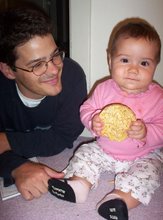Isaiah 1 is properly made up of 7 parts, the last being 12 statements. The topic is seems to be the judgement of Judah and Jerusalem. Being the beginning of the book, it carries an introduction which lists the author and time in which he wrote. This is significant for 2 reasons: 1st, it means we are able to clearly define when the author claims these statements were made, leaving no doubt as to the author's claim of when the book was written. Thus, if we are to debate the time of authorship, we must first acknowledge that we do not believe the word of the author. 2nd, because it shows that the author considered this information to be important. Most other books do not seem to find this valuable, implying that either: A) Isaiah was written after the other books, in a period in which placing the historical timeframe was already considered important; B) The author (Isaiah) considered that the author and time were necessary in order to estabolish the validity of what is said (i.e. -he knew that prophecies being fulfilled years later must be dated so as to avoid confusion); or C) both.
It does not logically follow that any books not introduced by an author and date must be written before Isaiah. It could be that they were written afterwards, but did not consider these author and date to be of consequence. But it does follow that Isaiah itself was written with an understanding of the weight of his words, and that the book would be read at a time years later, when time and author were not so obvious to the reader.
It could also be that the introduction was added later for clarity; a point made stronger by the fact that the introduction is not written in the 1st-person. This does not negate the authenticity of the text however; telling your audience what they're reading seems to be a natural thing when passing down a text. The question would then become, however, "how much later was the introduction written, and how much knowledge does the author of the introduction have about the actual author and date?" Still, assuming that the introduction was written either by Isaiah, or shortly afterwards, the above points still hold.
Isaiah 1 is also separated by the rest of Isaiah by a further (and shorter) introduction at the beginning of chapter 2. This is significant to us because it allows us to cleanly divide the chapter as a stand-alone text. That is to say, chapter 1 is a prophecy, and chapter 2 and the rest of the text are further prophecies. We can thus deal with chapter 1 as it's own unit.
Again, I see chapter 1 being made up of 7 parts, the 7th consisting of 12 statements. Whether or not I've divided the first [6] parts properly, the last is clearly it's own unit, being preceded by the statement, "Assuredly, this is the declaration of the Soverign, the L-rd of Hosts, the Mighty One of Israel:"
At the risk of oversimplifying, here is an outline of the 7 divisions:
1. The L-rd has spoken: rebellous children don't know their master, they've forsaken the L-rd.
2. You're injured & seek further beatings; your land is waste and daughter Zion is destroyed except for a few survivors.
3. the L-rd says: I hate your sacrifices & sabbaths. When you pray, I won't listen.
4. Wash yourselves.
5. Your sins can be cleaned; if you agree, you will do well, if not you'll be destroyed.
6. the L-rd says: Jerusalem is a harlot.
7. the Declaration of the L-rd (12 statements): I will destroy my enemies, purify you, restore justice, & you will be called faithfull city. Zion will be saved in the judgement, but sinners crushed because of their desires. The 2 (sinners and their desires) will be destroyed together. The last statement, about sinners & their desires, is made up of 6 statements, comparing sinfull desires to a terebinth (tree) and the sinner to a spark, which will burn up together with the tree.
These divisions are not all clear-cut. The 2nd division, about seeking further beatings, seems to be somewhat a development of the 1st idea, about rebellious children. And the 4th and 5th parts, about washing yourselves and the bargain about what will happen if you do, are clearly developments of the idea preceding. However, supporting their separateness, the 2nd part changes pronouns with the 1st. The 1st part talks to "them," while the 2nd turns it into "you." -an interesting switch, requiring that the reader own the sinfulness themselves (or rather, ourselves); this pronoun switch is repeated again in verses 8 and 9, and in 21 and 22, both cases talking about Jerusalem. The 4th part divides itself by virtue of the fact that it is 7 clear instructions for the believer. And the 5th part divides itself by virtue of the fact that it is preceded by a "says the L-rd" statement.
Alternatively, breaking the text down into more pieces, we could divide it thus:
1. The L-rd has spoken: rebellous children don't know their master, they've forsaken the L-rd.
2. You're injured & seek further beatings
3. Your land is waste and daughter Zion is destroyed except for a few survivors.
4. The L-rd says: I hate your sacrifices & sabbaths.
5. When you pray, I won't listen.
6. Wash yourselves.
7. Your sins can be cleaned; if you agree, you will do well, if not you'll be destroyed.
8. The L-rd says: Jerusalem is a harlot.
9. The Declaration of the L-rd: I will destroy my enemies, purify you, restore just counselors, & you will be called faithfull city. Zion will be saved in the judgement, but sinners crushed. They will be tricked because of their desires, and will wilt like a plant without water. They, and their desires, will be destroyed together.
Perhaps even, the text could be divided up thus:
1. The L-rd has spoken: rebellous children don't know their master, they've forsaken the L-rd. You're injured & seek further beatings; you continue to offend.
2. Your land is waste and daughter Zion is destroyed except for a few survivors.
3. The L-rd says: I hate your sacrifices & sabbaths.
4. When you pray, I won't listen, because your hands are dirty. Therefore, wash yourselves, your sins can be cleaned; if you agree, you will do well, if not you'll be destroyed.
6. The L-rd says: Jerusalem is a harlot.
7. The Declaration of the L-rd (12 statements, 6 stand alone, 6 devolop 1 idea in 3 parts): 1. I will destroy my enemies, 2. purify you, 3. restore just counselors, 4. & you will be called faithfull city. 5. Zion will be saved in the judgement, 6. but sinners crushed. 7. Part 1. They will be tricked because of their desires; Part 2. and will wilt like a plant without water; Part 3. They, and their desires, will be destroyed together.
This last way of dividing the text, I think, is most coherant.
I'm dividing up the text this way for a couple of reasons. First, I think the format of the text demands it. Isaiah, like much of the rest of the Tanakh, is written predominantly in poetic verse. This verse, at least as far as I know, uses very little of the repetition of sound and rhyme that we're used to. Instead, it uses the repetition of idea and structure. Picking almost any portion at random, we can see this repetition in verses 18 through 20.
It's written:
-Come, let us reach an understanding, says the L-rd
-Be your sins like crimson
they can turn snow-white
-Be they red as dyed wool
they can become like fleece
-If then, you agree and give heed,
you will eath the good things of the earth
-But if you refuse and disobey
you will be fed the sword
-For it was the L-rd who spoke.
Here, the idea of the L-rd speaking, found in the 1st statement, is repeated in the last. The 2nd and 3rd statements repeat themselves, but say it the 2nd time in a more poetic way. The 4th and 5th statements, rather than repeating themselves, state the opposite alternatives of each other. Thus, the verses reflect on themselves in a coherant and self-contained manner. Expounding upon this, the statements about sins being a stain which must be washed clean, reflect back to verses 15-17 where the L-rd does not listen to the people's prayers because their hands are stained, and then describes the process of purifying oneself. Verse 15 itself refers back to the idea, found in verses 10-14 of the L-rd turning his back on people because of their sin. And verse 10 uses an analogy between Sodom and Gomorrah which was started in verse 9. These references go on and on, creating capsules of information which, though self contained, lead us to other points surrounding and distant.
So the information is there, and written clearly; it is only our eyes which are shut. It is written:
"Surely, this Torah which I enjoin upon you this day is not too baffling for you, nore is it beyond reach. It is not in the heavens, that you should say, 'who among us can cross to the other side of the sea and get it for us and impart it to us, that we may observe it?' No, the thing is very close to you, in your mouth and in your heart, to observe it." -Deut 30:11-14
"-Wisdom cries aloud in the streets,
raises her voice in the squares.
-At the head of the busy streets she calls,
at the entrance of the gates, in the city she speaks out" -Prov. 20-23
"-It is wisdom calling,
understanding raising her voice.
-She takes her stand at the topmost heights,
by the wayside, at the crossroads,
-near the gates at the city entrance,
at the entryways she shouts." -Prov 8:1-3
"For the invisible things of him from the creation of the world are clearly seen, being understood by the things that are made, his eternal power and G-dhead, so that they are without excuse." -Rom. 1:20
On the other hand, it is said:
"-Hear, indeed, but do not understand,
see, indeed, but do not grasp.
-dull that people's mind,
stop its ears
and seal its eyes
-lest seeing with its eyes
and hearing with its ears
it also grasp with its mind
-and repent and save itself." -Isa 6:9-10
"Yeshua answered and said to him, "Amen, Amen (true, true), I say to you; except a man be born again, he cannot see the kingdom of G-d." -John 3:3
This is not to say that, by analyzing dividing up the text in the manner above, we are "born again." Nor am I saying that G-d has necessarily opened my eyes and ears; this would be an internally illogical assertation. -But in this manner, in this text, we are at least looking. This seems to be, at the very minimum, a prerequisite.
Sunday, June 13, 2004
Subscribe to:
Post Comments (Atom)



No comments:
Post a Comment